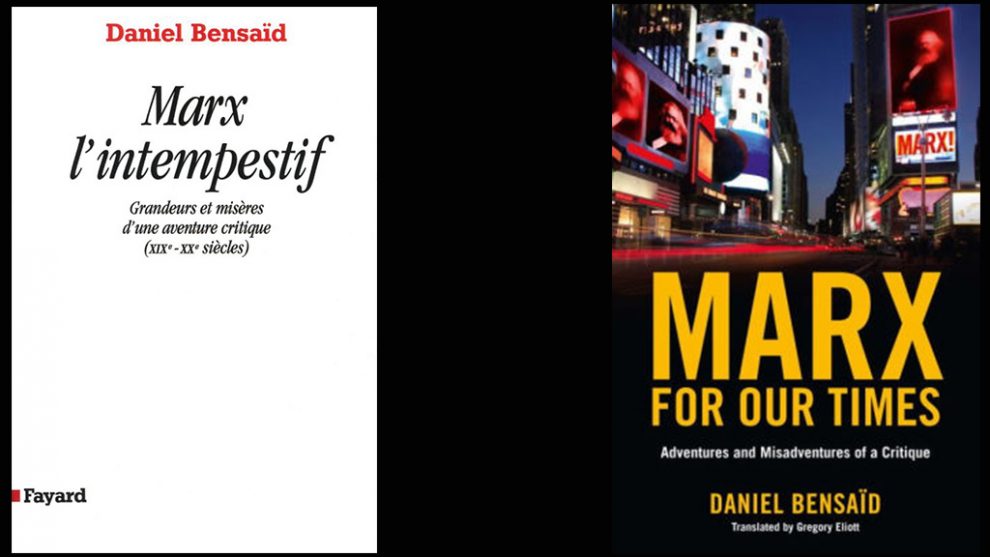To Sophie Bensaïd: ‘Militancy, of course, but mourning too: mourning and militancy’.
Daniel Bensaïd was without a doubt the most creative and innovative Marxist to come of age in the post-1968 period. Barely any other militant of his period had been able to weave deep theoretical intervention with illuminating aesthetic form in order to wage political struggle. His greatest theoretical achievement were his books The Discordance of Times and Marx, the Untimely, both of which were the result of over two decades of reading Marx, debating other theoretical currents and trying to work out a militant form of politics capable of overthrowing the political power of capitalist domination. Bensaïd was theoretically audacious and politically revolutionary, which means to say that he tried to renew the intellectual foundations of his own political current while also intervening into militant processes of politics in order to shape them.
It will take time to process his theoretical labours and adequately judge what novelty and clarification they bring. In this brief article I will sketch the main lines of his contribution, especially as regards his interpretation of Marx, since it has the most productive consequences for a rethinking of politics.
Thinking About Time Against The Grain
Reading dead authors always involves an intersection of meaning. Different horizons of meaning thread their way through one another – the context of the text’s production and the reader’s own subjective formation. The texts themselves stand yearning for a reader while the reader brings to bear specific political experiences, cultural heritages and social realities to the same text. Here the space for interpretation is made. Bensaïd’s interpretation of Marx should be approached in this way. His interpretation is bound to the difficulties of the neoliberal turn and the collapse of the Eastern bloc regimes, the culture of French Trotskyism, contemporary interventions into radical philosophy and the opened but closed possibilities for political intervention after May-68. He was a theorist of Marx who stood at the threshold of his epoch’s limits.
The central concept he brought to an interpretation of Marx was that of contretemps. In the first instance, the term itself has a concrete political meaning. It intervenes to explain the necessity of seizing concrete political opportunities in the context of upheavals and struggles; a lost opportunity is a defeated opportunity and it takes years, if not decades, to make good again. Even then, it is necessary to work within the folds of the anachronisms of political defeats to grasp the vista of new possibilities. When situations are over-determined by great political defeat, it is necessary to go against the grain in an untimely manner. It is here that the political meaning of contretemps materialises. It is associated particularly with Bensaïd’s own political history.
This political meaning is the key to Bensaïd’s Marx interpretation. The term actually appears in Marx’s Roy edition Le Capital, so it is not foreign to the text itself, or the theory. Marx writes of the way a long series of past, inherited evils coincide with the present situation, shaping the new developments emerging from its interstices. The dead seize the living; the nightmares of the past continue to weigh on the brains of those who continue to transform history. These realities engender political and social relations that unfold at contre-temps.
Schematically speaking, Marx can be read in two ways: through the notion of correspondence – think of the metaphor of the “base” and “superstructure” – or through the problem of contretemps, the discordance of temporalities. The former base and superstructure metaphor gives way to the problematic of contretemps because the latter underlines an understanding of the uneven relationship between material production and artistic, theoretical and political relations. These are all different forms of production and they do not develop at the same speeds; there is a specific rhythm to each sphere. Where the 1859 Preface insists upon the correspondence between – and adequacy of – the “base” and the “superstructure”, the notion of contretemps stresses the heterogeneous nature of the temporalities that work their way through each sphere. It shifts the eye’s view to the articulation of these forms – rather than their correspondence. Here a discordance of temporalities is expressed. To the extent that the base and superstructure metaphor holds, it is not to dictate the adequacy of the superstructure to the base in a crude determinist fashion, but to understand that a specific and determinate bundle of possibilities exist within each sphere about which development can take place. This results in a non-linear representation of historical development. In classical terms, such a reading of Marx theoretically elaborates upon Trotsky’s notion of uneven and combined development.
The Critique of Bourgeois Ideology of Progress and Historicism
What results did Bensaïd arrive at in his interpretation of Marx? He saw Capital as deploying a ‘new representation of history and a conceptual organisation of time as a social relation: cycles and turnovers, rhythms and crises, strategic moments and contretemps’.[1] Bensaïd thus reads into Marx a ferocious deconstruction of the old, vulgar and bourgeois philosophy of progress. This ran against the subaltern attitudes within the labour movement that had adopted a “historicist” vision of the revolutionary transformation of society, assuming it would follow a cumulative and continuous process until final victory delivers justice to the league of the just. But this is not a purely abstract and negative deconstruction of the philosophy of history. There is a positive theoretical victory that emerges from the deconstruction: Marx produces a critique of commodity fetishism that intersects with a thought incessantly working through the political subversion of the existing order.
Bensaïd was by no means the first thinker of temporality within the theoretical histories of Marxism. Taken in broad terms, Ernst Bloch, George Lukacs, Karl Korsch had pioneered a thinking of time, which involved a deconstruction of the above-mentioned philosophies of history. They produced insights that were more or less fragmentary. In the French interventions, Sartre’s Being and Nothingness had undertaken to think time under the influence of Husserl and Heidegger; Althusser and his students had themselves undertaken a critique of linear representations of history, which took provisional shape in Reading Capital and functioned as a subterranean and internal criticism of the official Stalinism of the PCF. Nicos Poulantzas reflected upon the way the capitalist state organizes the horizon of temporality and historicity in State, Power, Socialism. Of those thinkers outside of the official Marxist canon, like Deleuze and Foucault, traces and features of a thinking of temporality are also markedly present. And in the immediate lead up to the publication of Bensaïd’s The Discordance of Times and Marx, the Untimely, Derrida’s Spectres of Marx and Balibar’s The Philosophy of Marx had each explored the problem of time and history. So what made for Bensaïd’s specific contribution to Marx interpretation?
In lieu of a sweeping claim that would run beyond the confines of this short text, it is perhaps worthwhile staging a conflict of theoretical nuance by basing ourselves on the notes Bensaïd took of Balibar’s The Philosophy of Marx. It is important to remark that Bensaïd had written his notes upon the publication of Balibar’s book in 1993. This means that Bensaïd was articulating his own positions vis-à-vis Balibar, at a point when he could further develop his own ideas before publishing them in his major works on Marx and the themes indeed reappear. Balibar raised essential questions for a contemporary rereading of Marx: the ontology of relations as pertaining to the subject, the problem of ideology and fetishism, and time and progress. Bensaïd had explored many of these themes in Marx, the Untimely, yet it is to time and progress that I turn.
For Balibar, ‘the idea of progressive evolution in Marx is inseparable from a thesis on the rationality of history’.[2] Bensaïd seems to have agreed with this observation. But he disagreed with the aspect of it that situated Marx within ‘a problematic of universal history against which Marx had already clearly broken from the Holy Family and The German Ideology onwards in order to find “another way of writing history,” that is to say, another conceptualisation of temporality and non-contemporaniety’.[3] We have a tension here existing within a common project. While Balibar and Bensaïd were confronting the problem of time and progress, the former sees in Marx a subordination of history to a pre-determined teleological goal.[4] Of course Balibar sees that this teleological subordination co-exists alongside a notion of process that is made of material antagonisms at work within history, that do not obey the dictates of a pre-supposed historical plan. But the existence of such a teleological subordination is suspect and leads to contradiction. Bensaïd annotates upon certain passages of Balibar’s, annotations that appear again in Marx, the Untimely:
‘Having attributed an evolutionist and progressivist conception of universal History to Marx, Balibar interprets his last texts on Russia as “an astonishing turnabout, induced by a question from outside”: “Marx’s economism gave birth to its opposite: a set of anti-evolutionist hypotheses.” This hypothesis of a late reversal, as absolute as it was spectacular, is scarcely plausible’.[5]
Bensaïd’s critical questioning meant a non-acceptance of Balibar’s thesis of a third phase of the dialectic in Marx, as well as the existence of a specular pair of opposites at work within the theory, between an economism and its anti-evolutionist opposite. This was done for two reasons: one relating to “progress” and “Analytical Marxism” and the other relating to Marx’s new rationality.
First, Bensaïd held that the rejection of history – conceived of as an abstract, teleological unfolding of progress – did give way to a historical process of becoming-universal, that results from the aleatory political confrontations of struggle. This coexisted alongside the evolutionist temptations of the nineteenth century and was expressed in evolutionistic generalizations in texts like the 1859 Preface. This particular discussion led to a further elaboration of a conflict with Analytical Marxist orientations, which took shape in essays and chapters in Marx, the Untimely. Bensaïd saw Balibar’s stress upon the singularities of history and a unified measure of progress as existing in Marx as an untenable contradiction. It raises the problem of how progress is actually measured and ‘suggests the continuation of a discussion and, in particular, a confrontation with G. Cohen’s theses on Marx’s theory of history’.[6] The difficulty is real because, as Bensaïd sees it, Marx had tried to ‘extricate himself from the abstraction of universal History (the “floating universal”) without lapsing into the insane chaos of absolute singularities (“what only happens once”); and without resorting to the trump card of progress’.[7]
Why does this matter? With what consequences? The argument interrogates the meaning of political progress, as much as it concerns social development itself. Who is it that judges, and with what measure, a step forward in political progress? Historical narratives of progress and the chaos of absolute singularities cannot answer these questions. The notion of a political victory is not abstracted from the temporality of measuring itself, since today’s victories can become tomorrow’s losses, and the reverse. There is simply no fixed scale of comparison and measure from which political questions can be judged – Marx, the Untimely can be read as an attempt to respond to this reality theoretically. To believe that fixed scales exist for politics debilitates a theoretical comprehension of history as well as a political orientation to it because among other things it cannot answer to the contradictory nature of political victories, or the meaning of defeats and catastrophes, finally it reduces itself to quietism.
The second point relates to the content of Marx’s specific mode of thinking. Balibar furthers the discussion along the road towards an interpretation of Marx’s new “rationality” and by doing so Balibar complements Bensaïd’s efforts, when he writes:
‘Marx resorted less and less to pre-existing models of explanation and increasingly constructed a rationality which had no real precedent. That rationality is neither the rationality of mechanics, physiology or biological evolution, nor that of a formal theory of conflict or strategy, though it has recourse to all of these from time to time. In the incessant transformation of its conditions and forms, the class struggle is its own model’.[8]
In this presentation, the view of a homogenous, linear, universal History is ‘exorcized by the concept of a branching history, whose significance is identified by Balibar’. It can be said that both Bensaïd and Balibar were in the common project of thinking Marx’s novelty, i.e. of trying to represent Marx’s rationality that ‘had no real precedent’. For Bensaïd, this novelty was constituted by a condensation of critiques: the critique of historical reason, the critique of political economy and the critique of scientific positivism. This is the most productive place to look for Bensaïd’s specific contribution to thinking about Marx. It is to this I turn.
The Condensation of Critiques
Discussion about the breaks and continuities in Marx’s thought will not cease. With more or less precision, every author adopts their own modes of reading breaks and continuities in the Master’s thought. Though Bensaïd distances himself from an Althusserian notion of the “epistemological break”, he is no exception to this rule, for he sees a theoretical revolution in Marx’s writing of history: there is a break with the speculative philosophers of History in the early writings, yet the conceptual apparatus of the new writing is announced in the Grundrisse and then further systematized in Capital, constituting an ‘inaudible thunderclap’ because it produced ‘a mode of theoretical thinking that overturns the very idea of science’ (Maurice Blanchot). Fundamentally, however, he sees Marx’s thought as a critical theory of social struggle. This is a new object of theory, which provides for its unprecedented theoretical content. The conceptual revolution therefore requires a specific program of critiques.
Marx, the Untimely is organized along the lines of this tripartite program of critique involving “Historical Reason,” “Sociological Reason,” and “Scientific Positivism”. The program vast, but essentially comes down to saying that Marx’s work – from the 1844 Manuscripts to the Critique of the Gotha Programme – is critical throughout, but the concept of critique itself undergoes change according to the theoretical and political objects it is thinking and it produces new theoretical objects in its own right. It is a theoretical construction that articulates the specific operations of the capitalist mode of production as well as being a critical interrogation of the political and revolutionary movements for social emancipation. But critique itself is based upon a discourse that uneasily combined “English” science – the so-called hard sciences – with “German” science, which meant that the new way of doing science was able to confront and comprehend, in order to transform, the fetishised and reified surface appearance of capitalist society, which often engenders only an instrumental reason in its theoretical bearers.
The Specificity of Communist Emancipation
Bensaïd was a thinker of emancipation. The difficulty of emancipation remains tied to the necessity for its specificity. Emancipation from what? With what political forms? He has often been called a thinker of the art of political strategy, and while this is a just title, the more basic question revolves around Bensaïd’s concept of a specificity of emancipatory forms. If Marx had outlined in the very first line of Capital that his object of investigation were those societies in which the capitalist mode of production dominates, then with Bensaïd we can say that communism is the political form that struggles against the domination of the capitalist mode of production assume, in which ‘new life germinates and blossoms’. This conception of communism thus drew upon Heinrich Heine, ‘Communism is the secret name of this formidable adversary, who posits the rule of the proletariat with all its consequences in opposition to the current regime of the bourgeoisie’.[9] Communism is the really existing and specific form of movement that strives to abolish the present domination of the capitalist mode of production, involving an accumulation of the harshness of defeats and hopeful new beginnings.
The idea is often forgotten, or downplayed, but it remains a fundamental part of Bensaïd’s conception of the transformation of society. He often pointed out that the difference between the historical bourgeois revolutions and the socialist revolution is irreducible, since they have different objects and political tasks as their content. This specific irreducibility emerges from his theoretical and political writings, and can be conceived of as the irreducibility between the French Revolution and the Paris Commune. The irreducibility of these two political and social processes functions as a lynchpin between Bensaïd’s interpretation of Marx’s theoretical writings and his understanding of interventionist politics, understood as a strategic intervention into specific forms of emancipation from the capitalist mode of production and its associated multilayered oppressions.
.
Επιτρέπεται η αναπαραγωγή και διανομή του άρθρου σύμφωνα με τους όρους της άδειας Attribution-ShareAlike 4.0 International (CC BY-SA 4.0)
Υποσημειώσεις








